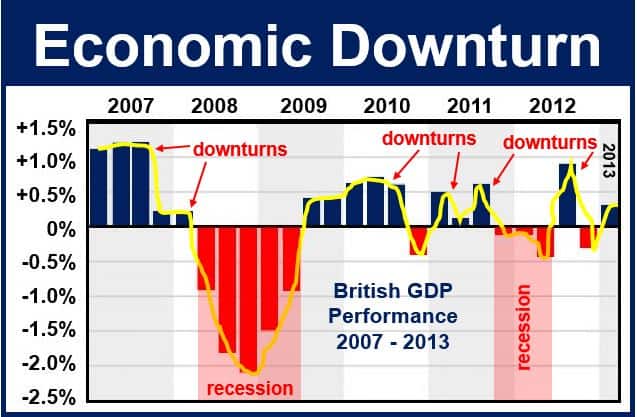An economic downturn, or a downturn, occurs when the value of stocks, property, and commodities fall, productivity either grows more slowly or declines, and GDP (gross domestic product) shrinks, stands still or expands more slowly.
An economic downturn is part of the economic cycle, i.e., the natural fluctuation of the economy between periods of growth and contraction. We sometimes refer to the economic cycle as the trade cycle or business cycle.
In most cases, a downturn refers to the downward movement on the graph. However, analysts and the press sometimes use the term when talking about a slowdown in growth.

During a downturn unemployment may rise and investors may lose a lot of money. People take longer to sell their homes and often have to lower their prices. Also, companies spend less on investment, and consumer spending and borrowing declines.
Economic downturn – borrowing
Borrowing by consumers and businesses goes down for two main reasons during a downturn:
- If people worry about their jobs, they are less likely to want to get into debt or further into debt.
- Banks become more cautious who they lend money to, i.e. getting a loan becomes more difficult.
Governments often have to borrow more during a downturn, because their tax revenues are smaller. There may also be rising spare capacity, i.e., companies producing less than they can.
An economic downturn may emerge as a country’s economy enters into a recessionary period. Downturns may also occur when the first signs of GDP contraction start to appear.
Recessions and depressions
A country is officially in recession when it registers two successive quarters of GDP contraction. If GDP continues contracting or not growing for over three years, the recession becomes a depression.
A downturn does not necessarily mean an economy is in recession. Often it is just a temporary blip which disappears in the next quarter.
